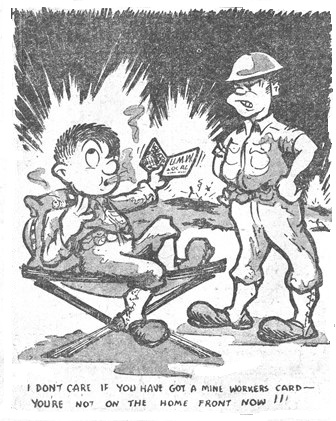
VOL. I NO. 39 REG NO. L5015 DELHI, THURSDAY JUNE 10, 1943.
|
DURING RECORD-SMASHING MONTH
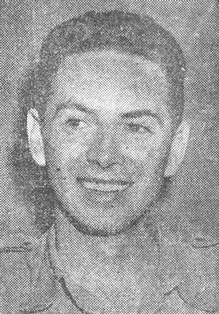 HARGROVE
HARGROVE
T/4 Marion Hargrove, 23, the pride of Charlotte, N.C., has arrived, period. The tall, skinny Southerner is the author of See Here, Pvt. Hargrove, a series of G.I. vignettes that has already sold 2,500,000 copies and is undoubtedly the classic piece of soldier humor to be produced so far in this war. of India on page below Strangely, Hargrove talks as if he was born and raised in Boston, a city he has probably never seen. When asked about it he said: "I think my mother must have been scared by a Limey movie." The humorist's Army career began July 17, 1941, a day, he says, that will live in infamy. He put in 11 months at Fort Bragg sweating out all forms of G.I. torture and writing about them in little pieces that appeared in the Charlotte News. Meyer Berger, of the New York Times, spotted the stuff and suggested that there was book material there. The articles were sent to Berger's agent, who brooded over them for a couple of weeks and returned them sans comment. Several months later, Maxwell Anderson spotted the manuscript, bounced same to a publisher and Berger's agent is now applying for room and board at some quiet lunatic asylum. A large part of Hargrove's book is devoted to his failure to attain promotions. He was not bothered by T/O difficulties. Having gone to work for Yank magazine, he has advanced to his present rather exalted station of T/4. The Roundup loves him because he saluted us exactly 14 times in one day - the first time that has ever happened in India. You should see that salute, gents. All he lacks is the bandana and an Eagle Scout badge. Oh, yes, he's going to write humor about this theater for Yank. |
Against Enemy-Held Territory
Maj. Gen. Clayton L. Bissell, 10th Air Force skipper, totaled his scorebook - all the "runs, hits and errors" - and announced to a jam-packed room at his monthly press conference that his team had accomplished record-breaking aerial slugging during the Merry Month of May.
Bissell disclosed the cogent figures . . . nearly 1,000 sorties made, the majority by bombers, during 135 missions; highest tonnage (for the second successive month) of bombs dropped against enemy installations; 10 Jap fighters knocked down, 12 probably destroyed and 12 damaged by unescorted bombers; such determined, unrelenting offense (the best-defense-is-a-good-offense theory) that not a single attack was directed against American bases in India; expansion of activities beyond smashing lines of communication to include paralyzing blows against oil and other supply centers.
This was the most important story the 10th Air Force chief had to tell. It was a story with a satisfying backdrop of a once-green unit that had "grown up" into long pants, was now experienced, coordinated . . . a vicious striking force with the sting of a cobra.
GROUNDED ONLY THREE TIMES
Weather conditions grounded the force only three times during the month, continued Bissell. When storms raged in northern Burma, it struck in the south. When weather was adverse in the south, it pounded the enemy in the north. Operations extended throughout the length and breadth of Burma, ranged as far as the Andaman Islands.
Heavy bomber sorties during May, he reported, were nearly 50 percent of the total number during the previous 13-month period from April 2, 1942, when the 10th Air Force made its first combat mission, to the first of last month. Sorties made by B-25's were 40 percent of those made during the same 13-month period. B-24 bomb loads averaged two tons per plane, for B-25's more than one ton per plane.
On three successive days, Bissell added, more than 100 tons of bombs smashed the Jap. The transcending total reached its peak May 19 when over 125 tons shattered "pay targets" in Burma.
EXPANSION OF TARGETS TIMED
Striking accuracy with bombs and havoc wreaked upon interceptors was not without cost, however. "Four of our planes failed to return, of which three were bombers," admitted the 10th Air Force leader.
Expansion of operations to include such targets as oil refineries and other supply centers was timed to a nicety. These targets were struck with success immediately prior to the monsoon, their destruction coming at a time when the enemy will have the greatest difficulty with repair and replacement.
Fighters supported ground troops by hacking at lines of communication in the enemy's rear area, and employing 1,000-pound bombs, they crippled "numerous railroad bridges."
An unusual citation has been given "X" bombardment group in this Theater. By order of the Secretary of War and over the signature of George C. Marshall, Chief of Staff, it reads:
"The X Bombardment Group, United States Army Forces in the Far East, is cited for outstanding performance of duty in action during the period January 14 to March 1, 1942. Opposing the full force of the numerically superior Japanese with all available aircraft, the X Bombardment Group participated daily in attacking the enemy whenever they found him during his prolonged drive through the Philippines and Netherland Indies to Java. Long-range bombing attacks were executed in the face of heavy anti-aircraft fire and large concentrations of enemy fighter airplanes over the target areas. Despite extremely adverse weather and dangerous field conditions, hampered by lack of adequate personnel to maintain aircraft in continuous combat condition, many successful missions were performed by crews fatigued from daily flights against the numerically dominant enemy. During this period great damage was inflicted on enemy aircraft, ground installations, warships and transports. Combat crews exhibited the greatest bravery and resourcefulness; the ground units, in the face of heavy enemy fire, performed all duties with utter disregard of personal safety. The superior courage and devotion to duty shown by this bombardment group will always be worthy of emulation."
CHENNAULT BACK FROM TRIP TO STATES
By PEPPER MARTIN United Press War Correspondent
Maj. Gen. Claire L. Chennault has returned to China to retake active command of the 14th Air Force at a time when speculation is widespread in Washington and London about blows against Japan which resulted from Lt. Gen. Joseph W. Stilwell's and Chennault's visit to Washington and Stilwell's later trip to London.
Such speculation may be a matter of wishful hoping according to evidence here, which indicates that the Casablanca decisions still stand, although the South Pacific may receive increasing attention.
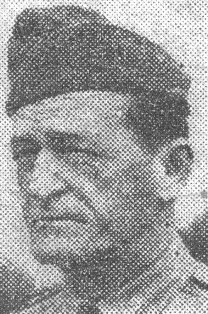 Chennault
Chennault
|
Although any decisions reached in Washington are still secret, it is generally recognized that increased air power both in India and China is essential for the immediate task of battering Jap communications and supplies, helping to prevent further consolidation of Japan's defensive position on the Asiatic mainland, while complete air superiority must be established when the Allies begin ground offensives anywhere on the mainland. These questions naturally were uppermost in Chennault's mind when he was in Washington.
It is now revealable that Chennault, prior to his Washington trip, urgently visited Chungking at Chiang Kai-shek's request, where presumably they discussed strategical questions and Chiang Kai-shek's ideas for mounting a mainland offensive against the Jap forces wherein Chennault's conversation with Chiang Kai-shek followed a similar Stilwell-Chiang Kai-shek parley.
Leathery-faced Chennault, grimy from the near-record trip from the United States, grinned when he saw Tokyo bombing fliers who will return to the United States. As he left the transport he remarked, "You're a helluva long ways from home, aren't you?"
Chennault said little beyond "I am glad to be back." Afterwards, he conferred with Maj. Gen. Clayton L. Bissell, Commanding General of the 10th Air Force, who flew to meet him. Chennault talked an hour with his group of bomber crew men who are returning to the United States, expressing hopes they return to China later.
Chennault wasted little time in India, flying almost immediately to China, where the air force supporting the Chinese helped defeat the Japs along the Yangtze River. Although the drive, according to the best informed, never was intended to take Chungking, but was the usual, normal, "rice collecting offensive." Americans showed how small an air support can radically assist the Chinese.
Chennault may have a few surprises for the Japs. He would not disclose future plans, but ironically commented, "The Japs hit us (the 14th Air Force), and hard the moment I left China," inferring the position would be reversed the moment he returns.
The trip to India was marred on the final day when the giant passenger plane piloted by Capt. R. E. Keeler, veteran Pan-American pilot from Miami, Fla., after bucking strong headwinds for hours, landed in an emergency field due to lack of gasoline. While Chennault and other passengers sweltered in the heat and sand, gasoline was flown to them from the nearest base. Chennault rode in the rescue plane toward India with Keeler's plane following.
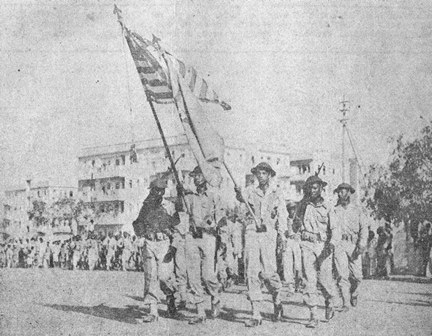
|
14TH AIR FORCE
AIDS CHINESE
Communiques from the 14th Air Force show that the determined Chinese Army drive toward the Jap stronghold of Ichang has been substantially aided by U.S. bombers and fighters.
While a communique which just reached the Roundup is a week late, it is pertinent to report a May 31 action against Ichang in which 26 Jap planes were destroyed compared to two 14th Air Force planes missing.
In a combined operation with the Chinese, B-24's were intercepted before they reached Ichang. Chinese pilots, led by Col. John Allison, gave excellent top cover. They knocked down three Japs, with three probables. The B-24's gunners destroyed 20 Zeros, were credited with five probables. They then proceeded to Ichang to complete their mission. At Ichang and during other attacks upon Siaokan, Kokow, Changanyi and Tengchung, two other enemy planes were destroyed on the ground.
The day before, Ichang and Shasi were visited by P-40's and B-25's.
The most recent communique from the 14th Air Force tells of widespread action on June 6. A formation of B-25's, escorted by P-40's, attacked the Pailoki airdrome near Yochow; P-40's dive-bombed and strafed bridge approaches at Puchi and destroyed two locomotives on the Canton-Hanyow Railroad; P-40's strafed enemy river craft between Ichang and Shasi and raided the airfield at Shasi; and P-40's struck at Tangyang, strafing the motor pool (destroying 15 trucks), personnel and barracks.
On May 2, P-40's strafed retreating Jap troops between Changyang and Itu and threw six columns into rout. On the Yangtze River near Itu, six landing barges, one supply barge carrying 13 crated planes and 10 launches each towing barges were caught by P-40's and severely struck. In the face of heavy enemy anti-aircraft, B-25's dropped tons of bombs on Pailoki airfield.
P-40's dive-bombed and strafed warehouses and railroad yards on the railway line near Changanyi.
 NEW MEMBERSHIP CARD
NEW MEMBERSHIP CARD
By LT. VERNON J. HENDERSON
CHINA AIR BASE - A new member has gained admittance to the exclusive Walkers' Club - Lt. R. P. McKinnon, member of "X" Fighter Squadron.
McKinnon earned his membership card after a seven-hour truck ride down the Burma Road, preceded by a 21-day trek from northern China.
He had been reported missing since May 2.
After the completion of a routine patrol flight, Mac ran into the curse of all aviators, overcast
|
The lieutenant radioed he was going to bail out, did same. When he jumped, he had the presence of mind to wave a Chinese flag as frantically as possible.
His landing was not soft, but all he suffered was a slight back injury. He was met by a fisherman from a nearby Chinese village. There he was taken, where he rested three days.
When he left the village, he was escorted by two Chinese youngsters and entered upon a six-day walking and riding expedition to another village. It is easy to imagine his surprise and pleasure when he contacted someone there who understood English. There was an airport and a telegraph office. Rejoicing, he sent four telegrams and four letters to his home base. Unaccountably, they never arrived.
While sweating it out for 10 anxious days, MacKinnon amused himself by playing basketball and hobnobbing with a Chinese colonel. The colonel was a real pal. He constructed a special fork for Mac so he could eat his boiled chicken, eggs, rice and other Chinese dishes without the anguish that chopsticks usually bring to unaccustomed users.
On May 20, Mac finally grew tired of waiting and decided to set out for home. With a horse and some Chinese soldiers hired on the mayor's insistence because of the presence of mountain bandits, he started a 19-hour ride by pack mule to another town, where he stopped for the night.
The following day found him enjoying the soft luxury of a sedan chair, which was a relief to that part of his anatomy which contacted the mule's back the previous day. By this means of transportation, he reached a village on the Burma Road.
From that point, he was taken to his base by an army truck - 21 days after he had bailed out of his fighter plane.
India Explained By ‘Authority’ From States
By T/4 MARION HARGROVE Author of See Here, Pvt. Hargrove
In order that American soldiers who have been in India only a few months may better understand the country, the following facts are published by a noted authority on India who arrived here from the States last Saturday. Before coming to India last week for the first time, he was a leading authority on the strange manners and customs of Brooklyn, N.Y.
A strong feeling of sympathy and fellowship exits here between American troops and the Indians of the lower social strata. Indians in the small-income brackets always accost a Yank with the friendly greeting, "Baksheesh," which apparently means, "It's good to see you again," and the American replies with equal warmth, "Jao," which means, "It's good to see you, too."
None of the natives found leaning against lamp-posts have a mother or a father. They bear this grief with evident patience and ask nothing more of life than eight annas. The only persons in India who have mothers and fathers are beautiful Indian girls, who also have brothers, sisters, uncles, aunts and cousins - all of whom ALSO like to walk in the park or be taken to the movies by American soldiers.
The people who conceive the warmest friendship for G.I.'s are the drivers of tongas. These become so attached to a customer during the course of a short ride that when the customer pays his driver and walks away, the driver is so sorry to part company with him that he follows the Yank for blocks on foot, protesting, "No, sah'b! No sah'b!"
Indian bearers and tonga-drivers are exceedingly modest about their incomes. Their favorite expression is "Poor man, sah'b."
Bearers and sidewalk salesmen hold American enlisted men in the highest esteem. A private in the American army is addressed as "sergeant sah'b" until he is promoted to private first class. He is then addressed as "major sah'b."
Indian mystics have a strange and marvelous gift of foretelling the future. They can tell everything except when you're going back home.
So helpful is the climate here that neither hair-driers nor baking ovens are needed between the end of May and the beginning of the rainy season.
|
Recently, a 10th Air Force communique announced a successful bombing operation against targets in Jap-held Burma. On the formation's return flight, it continued, the B-24's were intercepted by 25 Jap fighters. A fierce battle followed for the next half hour. Five Zeros paid the price, three more were probably destroyed and six others were damaged.
Tersely, the communique concluded... "one of our aircraft is missing."
Those last six words were amplified this week by 19-year-old Sgt. Mervin Wayne Beckmen, of Inglewood, Calif.
Presumably, Beckmen is the only survivor of the bomber. From a bed in a Calcutta hospital, he told how, their plane crippled, he and his fellow crew members bailed out . . . only to be mercilessly machine-gunned.
PRESUMED DEAD
Crewmen of the other bombers of the formation reported seeing the parachutes of three of Beckmen's mates ripped to shreds, so it must be presumed they were killed by the fall. These observers of the tragedy believe one parachutist, besides Beckmen, might have reached the ground safely. However, there has been only disheartening silence from the matted Burma jungle.
Beckmen, wounded during the scrap between the bomber and its attackers, escaped death by "side-slipping" his parachute and causing Jap bullets to miss.
"The gunner and myself first sighted 10 fighters of the Jap formation to the left and rear of our plane and about a mile away and 1000 feet below," Beckmen related. "The squadron leader gave us orders to increase speed, but in a short time we were attacked from all directions.
BECKMEN INJURED
"From my post I was unable to get a complete view. About 10 minutes later, our rear gunner was killed. I took over and continued firing. By this time the tail section of our plane had been completely shot off and we started losing altitude."
It was then that the crew bailed out. Beckmen with a bullet wound in his right leg, one in his right arm, two in his left hand and one in his forehead.
He told how the crew was mercilessly machine-gunned while parachuting down. Three fighters singled Beckmen out.
Upon landing, the sergeant sought to attract the attention of other members of the crew who might have escaped Jap bullets. He received no response. Eventually, he started out alone, although weakened by the loss of blood.
Not until four days later did he stagger into British troops.
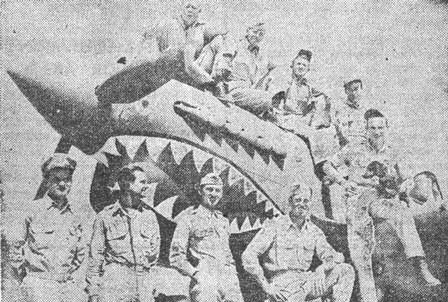 Out of China these days comes frequent news of Jap planes being erased from the sky by hard-hitting members of the 14th Air Force.
This photo was taken shortly after a recent engagement in which these fighter pilots accounted for 15 confirmed and 10 probables without loss to
themselves. On plane, left to right: Lts. James W. Little, G. R. Casey, Matt M. Gordon, Charles J. Chrysler and Maj. Edmund Gross, holding Maj. Gen.
Claire Chennault's dog, "Joe;"
on ground: Lts. Edward H. Calvert and Mack Mitchell, Col. Bruce Holloway and Maj. Roland Wilcox, Capt. Dallas Clinger flew from another field
to get into the scrap.
Out of China these days comes frequent news of Jap planes being erased from the sky by hard-hitting members of the 14th Air Force.
This photo was taken shortly after a recent engagement in which these fighter pilots accounted for 15 confirmed and 10 probables without loss to
themselves. On plane, left to right: Lts. James W. Little, G. R. Casey, Matt M. Gordon, Charles J. Chrysler and Maj. Edmund Gross, holding Maj. Gen.
Claire Chennault's dog, "Joe;"
on ground: Lts. Edward H. Calvert and Mack Mitchell, Col. Bruce Holloway and Maj. Roland Wilcox, Capt. Dallas Clinger flew from another field
to get into the scrap.
|
DANCE, BEER
PROMOTIONS
UP IN ASSAM
ASSAM AIR BASE - Everything broke loose at once when slap-happy G.I.'s got their paws on beer and promotions and enjoyed a squadron dance held Memorial Day.
At the dance, all went smoothly with exception of a few moderate mishaps. Only two-thirds of the ladies invited put in an appearance; the soda water machine broke down and the orchestra, engaged weeks in advance, chickened-out and accepted another date, keeping it a secret. Two British Tommies saved the day, however, by volunteering their services on the piano and drum.
A jitterbug contest was staged, the proud winner being Sgt. Harold Busch and his partner, who completely dazed the locals and possibly shocked them a bit. First place in the waltz contest went to Sgt. Paul Hulick and his charming gal-friend.
To add the finishing touches, a British beer ration came through. Three quarts were allotted each laddie. Not much, but enough to get a little wacky.
The next day a lengthy list of promotions was published, ranging all the way from private first classes to sergeants. A promotion to technical sergeant is yet to come.

THE DESERT SIND The merciless sun in the Desert Sind, Beats down upon the cursed land; All growth is withered in the fiery wind, Evil lies in the drifting sand. No mortal lives in its desolate waste, 'Tis forsaken by God and man, Made only to please the Devil's taste, And to house his reptilian clan. For sleeping here in the hellish sun The lizard and the cobra lie; A o'er the sand the jackals run, As sleeping watch, the circling buzzards fly. Evening falls and cloaks the scene With darkness; the rising moon Bathes the waste with solver sheen; The whispering wind sings a ghostly tune. The Masters' touch has changed the land. Myriads of stars make the Heaven's fall. 'Tis more wonderous than a fairyland - Beauty's mantle envelopes all. - By Pvt. ANTHINY J. TARINELLI |
|
A WOMAN OF BURMA SPEAKS Awaken, little one, and go Before the teakwood trees Are touched by morning and become Alive with enemies. They took your father. Oh, my son, How thickly dark and red The blood ran on that afternoon They struck him swiftly dead. Your brothers marched into the south And no one now can say If still they live, or if they fell At Prome or Sandoway. But there beyond the Naga Hills Are friends who fight until The world grows sane again and men No longer lust to kill. Go be with them. The dawn is near Our parting must be brief, Although my heart is cold and numb There is no time for grief. Nor mind not leaving me alone. For you are young and strong, While I am old and worn by life And here's where I belong. The wars may come, and husbands go, And children say goodbye, But Burmese mothers always stay At home until they die. |
|
Until our land is free once more Your work will not be done. Now lift your head up toward the sky, Farewell - farewell, my son! - By Sgt. SMITH DAWLESS AT THE END OF THE RAINBOW I stood at the end of the rainbow, But not in the fields nearby, It was far from the day of childhood And under a distant sky - I was scarred with the years of struggle, And had waited wearily. No, I never reached the rainbow, But the rainbow came to me. I stood on a shower-drenched hillside When the sun was in the West, Without a thought of the rainbow And my half-forgotten quest. When suddenly all about me A glory was flaming free. A wonder of shining color, The rainbow had come to me. Though vain are your years of searching, And empty your groping hand, Doubt not there will be a moment In some distant day and land When a glory will be about you That your youth-dreams never knew. Do your duty, and wait in patience, And the rainbow will come to you. - By WILLIAM WIGGINS |
10th Air Force Misses Only Day’s Action
Despite the monsoon, bombers and fighters of the 10th Air Force missed only one day's action over Burma during the period May 2-7. A thumbnail sketch of the communique:
June 2 - Heavy bombers attacked radio installations on Diamond Island, southwest of Rangoon. All bombs were reported in the target area.
June 5 - Mediums attacked enemy warehouses and railroad installations at Alon; buildings at Paukkan; oil installations and water filter plant at Chauk; barracks at Monywa - all with success.
June 6 - B-25's damaged tracks and rolling stock at Mandalay, pounded the ferry slips at Sagaing and destroyed tracks and rolling stock at Ywataung and Monywa.
June 7 - Fighters attacked Jap encampments at Wehsi.
Motor Conks, But Mission Carried Out
By S/Sgt. ROBERT E. BADGER
CHINA AIR BASE - Lt. John H. Keene is the first member of this heavy bomb group to be awarded the Air Medal.
Despite the fact that one of his plane's four motors "kicked out" soon after he left the home field, Keene refused to turn back and successfully piloted his bomber on a recent mission.
His bomb load dropped on the Jap target, Keene, who hails from Miami, flew his ship safely home despite hazardous weather conditions and the handicap of a feathered prop.
To T/Sgt. Rex L. Murphy goes the distinction of being the first member of the group to receive the Purple Heart.
Sgt. Murphy received slight injuries recently as the result of Jap actions but was back on the job within a short time after being treated by the medicos.
LUCK FROM SNAKE?
News from Maj. Walter Beat's squadron: The athletic program thus far here has consisted of softball, volleyball and horseshoes. Squadron officers and enlisted men of the combat crews are waging a hot fight for the handsome rotating trophy donated by Beat and Capt. Philip Adler.
Stars of the officers' team include Lt. James Stark, who comes from one of Dakota's flag stops; Capt. George Bell, who some claim sold liquor to the Indians at Seminole, Okla.; Lt. Bert Webb, of Ann Arbor, Mich.; Lt. Hank Waters, the proud owner of three Houston, Tex. oil derricks which the government is using for scrap metal; Lt. James Lichtenfels, the syncopated Cincinnati screwball; and Lt. Louis Roseling, Bradley Tech's pride.
Roseling and Lichtenfels haven't been hitting any too well of late, but Lichtenfels claims that the pet snake he keeps in his room will change their luck.
In the squadron's first game with the group outfit, the squadron was soundly trounced but the second game proved different. Our men eked out a 6-5 triumph, although three runs were questionable.
SHANGRI-LA
Poop From The Group - Maj. O'Brien's Shangri-La is still keeping James Hilton's memory alive. Rumors have reached this headquarters that many of the boys are all for staying there after the war.
Capt. Harry Musinski, popular "Swat of Softball," is now a member of O'Brien's Shangris and is sorely missed by the group team.
Maj. Hank Brady is still keeping his bunch flying, with the three great mustachioed Lotharios, Capt. Bob (Des Moines) Burnett, Capt. John (De Ridder) Carey and Capt. Danny (Albuquerque) Dannel giving their usual fine co-operation.
Old Capt. Bill (Indiana) Ellsworth has his squadron hitting the high spots in its usual manner. Capt. Bill, with his Bill Powell mustache flying in the wind that the venerable jeep "75" kicks up, tears around his layout, keeping his eye on everything.
Lt. Fred Wall, Capt. Jesse (Pop) DeHay and Lt. Dave (Lucky) O'Donnell and Capt. Ellsworth.
Lt. Arthur Karp, whom New York has taken to its heart, aided by Lt. Morton Salk, provides the comedy that makes Bob Hope's memory a thrilling moment. This squadron's ball teams are still the best from where we sit and we're nominating T/Sgt. Bill Thompson as the best in China.
The group enlisted men have proved that they are the boys who left the "femmes" behind, judging by the volume of mail they receive.
Fatigue Detail Rears Ugly Head For IATF White Collar Brigade
By S/Sgt. KARL PETERSON
HQS., INDIA AIR TASK FORCE - Members of the "Royal Order of White Collar" had a rude awakening last week at IATF Headquarters when an old friend from former Army days reared its ugly head - the fatigue detail. What with construction and alterations on the building and the consequent stacking of supplies, etc., in the yard, the jernt had begun to look like a cross between a fish market and the city dump. Something, opined Col. C. E. Combs, had to be done.
So our stalwarts donned spotless fatigues, pulled horsehide gloves over their smooth hands, and pitched in with a will. Yawning holes in the yard were filled, unsightly piles of dirt vanished, and crates were neatly stacked away out of sight. Star performance was the hauling away of a flock of empty five-gallon gasoline cans: Our bunch of eager beavers rained cans on the truck bed with a crescendo like the 8th Army barrage at Tobruk.
COLLAPSED ON BUNKS
Afterwards, with flushed, perspiry faces and between short breaths, the lads agreed there was nothing like good hard physical labor to give one a sense of accomplishment - then they one and all collapsed on their respective bunks.
A flashback of reminiscences from two weeks at rest camp: The Indian bus driver looking back to check on the bus behind him while the abyss loomed ahead on the curve of the mountain road; a bed composed of two slabs of corrugated iron topped by a mattress cover-full of shredded (with lumps) cocoanut husks, a big improvement on the medieval rack-and-wheel so popular with the Inquisition; G.I.'s definitely without previous service in the cavalry trying to gallop dashingly up the bridge paths, and bouncing out of their English saddles to end sprawled gracefully on the horse's neck; the troops pelting baksheesh-wallas in the railroad stations with G.I. hardtack from the car windows, and how they scrambled for the stuff; yelling gangs of doggies, in their shorts only, taking quick showers during train stops under the giant water spouts used to fill the locomotives; and finally, "corned willie," coffee made in a can with hot water from the engine, and hardtack, real iron rations.
"First" Lt. Cy Grossman led the promotion parade recently, while four boys added their first rounded chevron, "To be Staff Sergeants" Harold Fioravanti, John Murphy, Bill Taylor, and the editorial we, thine 'umble scribe.
Tokyo Raiders On Way Home For U.S. Duty
Three "Bomb Tokyo" fliers have left for home after more than a year's active flying in the C.B.I. Theater, but they are eager to take another crack at Tokyo from any direction... any time.
They were part of six fliers with a year's experience in China and India who are returning to help teach new fliers in the technique of meeting the Japanese in the air either as fighters or bombers.
The three fliers are Jacob Manch, of Staunton, Va.; H. E. Crouch, of Columbia, S.C.; and W. M. Fitzhugh, of Galveston, Tex.
The three other fliers also going home were Charles Clarino, Rutland, Vt.; John Reese, New York; and George Stout, of Emporia, Kan. All are in good health, but are glad for a chance to return home.
Manch, who came through recent Japanese air raids on an American air base in China, said those fragmentation bombs "made Christians out of us." When bombs began bursting at one end of the runway, he dived into a shallow trench only to find a fellow officer already lying flat in it. Manch climbed in on top of him and yelled "dig deeper you blatherskite (Editor: Make you own deductions) my back and my rump are showing above this trench."
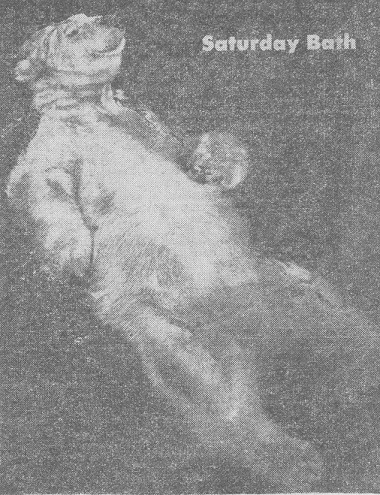
|
‘GLORIFIED ALLEY CAT’
ADOPTED BY BULLTOWN
By SGT. REX SMITH
BULLTOWN - Presented to Bulltown by Brig. Gen. Frederick McCabe, the village's No. 1 citizen, was the dreaded jungle cat of India. Known to the local Yanks as the "Glorified Alley Cat," the three-month-old tiger cub has been officially designated as mascot.
Seldom found in India are domestic types of the cat family, but now the Yanks have decided to try their skill such as Clyde Beatty never dared. India, the haven for jungle beasts, has fallen under the G.I. touch and Bulltown comes forth with another celebrity who will work his way up the ladder of fame, changing the species of the cat family from the rapacious to the domestic type.
Sgt. Hattley H. McDowell of the "Dits and Dahs," an old hand at wild animal training, started out with the careful and skilled handling of a mongoose, followed by other odds and ends until this spotted masterpiece arrived. McDowell, with side-glances at the cat's leering eye, has finally accepted the job as trainer and master of India's most dreaded four-footed animal.
Arrangements have been made for excellent care and plenty of food. Requirements at present are only four pounds of meat per day. The treasurer of Bulltown hopes to be able to supply enough rupees with the growth of the mascot.
On being interviewed, the "Glorified Alley Cat's" only statement was, "I'm mortified."
G.I.’s Return From Rest Camp; Hopes For Bars Strike Snag
By Sgt. D. S. CLARK
CENTRAL INDIA AIR DEPOT - The first group of men to return from the rest camp in the hills gave varied reports on what's what up there, leaving the rest of us more in the dark than ever. By and large, however, the "rest" part of it can be taken literally, it is understood, although there is plenty of tennis and horseback riding and occasional trips to nearby communities. Every one of the men came back deeply tanned, and several of them voiced the opinion that they were ready to go back.
The hopes of OCS applicants - reported in this pillar last week as having been given a lift - have again been dashed on the rocks, at least for nominally able-bodied G.I.'s who aspired for administrative commissions. The latest dope is to the effect that limited-service men and men over 35 years of age will be given the preference in administrative schools. This presumably leaves only tactical branches for "he-men," and, of course, it is inferred that any G.I. capable of withstanding the ordeals and vicissitudes of life in this Theater is capable of totin' a full field pack in addition to any bars that might accrue on his shoulders. In short, if you're sweatin' an Air Corps Administrative OCS - don't.
Now it can be told! Here is a quote from a hand-bill put out by a local theater plugging To Be or Not To Be: "The last picture of America's beloved Carole Lombard, whose brilliant career was terminated in an accident superbly directed by Ernest Lubitsch."
In line for congratulations last week were several officers and enlisted men who were rewarded with promotions. Space limitations do not permit the listing of all of them, but there is room to mention the fact that another enlisted man of this command has attained the rank of Warrant Officer (jg). A sweeping salaam and congratulations to former T/Sgt. Walter A. Klein.
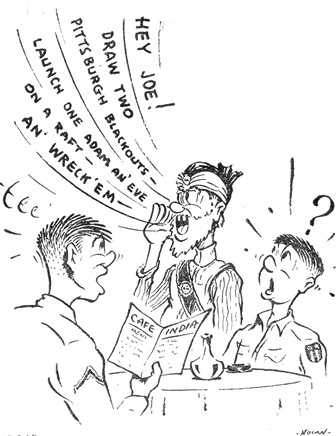
|
By Sgt. D. S. CLARK
The American, a provincial character at best, goes into a foreign land and usually fails to learn a great deal about the country's history, folk ways, customs, much less learn its language.
That characteristic has been particularly noticeable in this theater, where the traditional attitude is one of "sweating it out" until that halcyon day when the dove of peace delicately drops Guano on Hirohito's grave.
Those officers and men engaged in the training of Chinese troops have been required to study Chinese in regular language classes held in the evenings after work and have usually graduated cum laude with a knowledge of Chinese limited to How Boo, How-Ding, How-Ding Boo How or any other variations of the traditional salutation and reply.
On the India side of the fence a similar situation exists. The language walla who approaches your basha and softly informs you that he will teach you Urdu, Hindustani, or what you have you in 10 easy lessons usually finds his pleas falling on deaf ears.
The Yank in India has largely limited himself to the mastery of such Urdu as will take care of his primary needs. Currently water is in great demand for drinking as well as bathing. He knows that pani means water and lao means bring - ergo "pani lao" may bring the desired commodity depending upon the state of mind and general interest in the war effort demonstrated by the paniwalla. All have learned that a peg is a whiskey drink, a cota peg is a small whiskey and a burra peg is also a small whiskey, propaganda to the contrary notwithstanding.
The Chinese and the Indian, on the other hand, seem to have taken a more than academic interest in the peculiarities of the American vernacular.
The Indian peon, for instance, accustomed for generations to the rendition of a soft "salaam sahib" when approaching the white man, is quite apt to give with a "what's cookin,' Sahib?" and pass on with an air of quiet dignity.
We were wandering about a small Chinese village in Yunan a while back when approached by a group of bright-eyed urchins. They gave us the short bow in the ceremonial Chinese manner and said in chorus, "how boo how." Gravely we replied, "ding how" and then asked "how boo how" on our own. Needless to say it was a decided shock to get a lusty chorus of "OK's" from a group of Oriental six-year-olds whose knowledge of American culture must have been limited to observations of the cut of the American uniform and the possible idiosyncrasies of troops on the loose.
In India the development of the American vocabulary as expressed by the youthful resident occasionally shows evidence of careful coaching from officers and men obviously of the same low stripe as those who spend hours teaching a parrot various elementary forms of profanity.
One is occasionally stumped when approached by somebody who (usually with fine euphony) rattles off apiece devoted to the baser aspects of sex. The pitchman in this case undoubtedly thinks he's asking you the time of day, the condition of your grandmother's clock or does or does not the Atlantic Charter apply to India. The anatomical knowledge of some of these youths, as expressed in their memorized speeches, is the kind that would cause your maiden aunt at home to take the culprit by the ear and march him straight to the nearest minister.
The C.B.I. Roundup is a weekly newspaper published by and for the men of the United States Army Forces in China, Burma, and India, from news and pictures supplied by staff members, soldier correspondents, the United Press, and the War Department. The Roundup is published Thursday of each week and is printed by The Statesman in New Delhi, India. Editorial matter should be sent directly to Lt. Floyd Walter, Rear Echelon Hq., U.S.A.F., C.B.I., New Delhi, and should arrive not later than Monday in order to make that week's issue. Pictures must arrive by Sunday and must be negatives or enlargements. Stories should contain full name and organization of sender.

JUNE 10, 1943
Adapted from the original issue of C.B.I. Roundup
Copyright © 2015 Carl Warren Weidenburner
TOP OF PAGE PRINT THIS PAGE ABOUT THIS PAGE SEND COMMENTS
PREVIOUS ISSUE CLOSE THIS WINDOW NEXT ISSUE
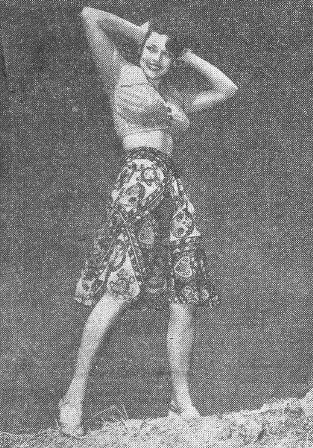 No caption material accompanied this week's cheesecake.
The personal touch is missing, but the fact the provocative young lady must remain anonymous weakens the art not a whit.
No caption material accompanied this week's cheesecake.
The personal touch is missing, but the fact the provocative young lady must remain anonymous weakens the art not a whit.
